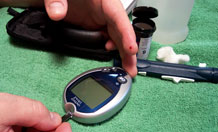
Doctors only expect half of patients with type 2 diabetes to reach their blood sugar goals
"Clinical inertia" in Type 2 Diabetes revealed in new survey
Only half of patients with Type 2 Diabetes make the recommended lifestyle changes which could stop them developing complications, whilst physicians often delay escalation of treatment that may better control blood sugar.
These findings are among a series of revelations from a new global survey, which highlights “clinical inertia” among doctors and people with Type 2 Diabetes treatment.
Research carried out by Novartis Pharma AG, with the University of Exeter Medical School revealed that three quarters of people with Type 2 diabetes are not concerned about developing complications. Only 40 per cent say they increase their level of exercise after diagnosis, despite receiving regular counselling on the importance of lifestyle changes. On top of that, doctors admitted that they only expect around half of people with Type 2 Diabetes to reach their blood sugar goals.
The results were uncovered in the Time 2 Do More in Diabetes survey, presented at the International Diabetes Federation’s World Diabetes Congress 2013 in Melbourne, Australia, today [December 5 2013]. The survey investigated the perceptions and behaviours of 337 physicians and 652 people with Type II Diabetes in the UK, US, Spain, India, Japan and Brazil.
Dr David Strain, of the University of Exeter Medical School, is chairman of the steering committee behind the survey. He said: “The low expectations described by both physician and people with diabetes appear to be self-fulfilling prophecies, leading to diet and lifestyle advice being ignored by patients and a failure to appropriately escalate therapies, termed therapeutic inertia, by the doctors. This must be reversed if we are to tackle one of today’s biggest global health problems. The Time 2 Do More™ survey is the first step in a multi-faceted initiative to identify and address the barriers to improved care, including communication between physicians and people with type 2 diabetes and indifference toward treatment goals and complications related to the disease.”
Worldwide, more than 382 million people have diabetes, with one person dying from the disease every six seconds. Type 2 Diabetes accounts for 90 percent of all cases of the disease. In the UK it costs the NHS £296 per second and roughly 50% of diabetic patients die prematurely of stroke and heart disease. Alarmingly, 42 percent of people with Type 2 Diabetes who are treated for the disease do not reach their blood sugar goals, putting them at higher risk of organ and tissue damage, blindness and even death
Dr David Strain is chairing the steering committee, which includes as members Sir Michael Hirst, President of the International Diabetes Federation (IDF), Dr V Mohan (India), Dr Sérgio Vencio (Brasil), Dr Xavier Cos (Spain), Dr Zoltán Vokó (Hungary) and supported by Novartis PharmaAG,to analyse the survey findings in an effort to identify ways to improve care. The international, multi-disciplinary Time 2 Do More steering committee assembled at both the American Diabetes Association (ADA) and European Association for the Study of Diabetes (EASD) congresses earlier this year to review the survey results and discuss next steps to help progress the management of the disease.
“The Time 2 Do More™ survey adds a wealth of data from a diverse set of physicians and people with type 2 diabetes that gives us insights into what needs to be done to provide better outcomes for those with the condition,” said Dr Strain. “In collaboration with Novartis and an esteemed panel of steering committee members, I look forward to translating these findings into simple and actionable recommendations with the aim to improve overall care for people with type 2 diabetes.”
Image via Shutterstock.
Date: 5 December 2013
